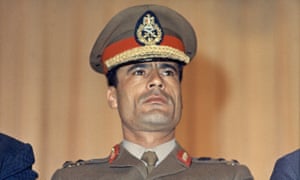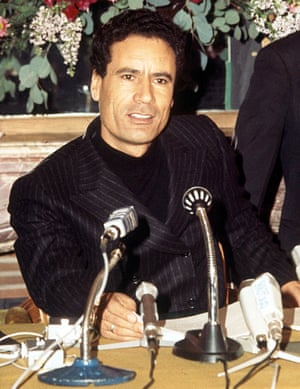bY: sAMMI iBRAHEM,sR
Gaddafi’s brotherly censure – archive, 1973
17 April 1973: Libya leader is growing increasingly impatient with his Arab allies, Syria and Egypt, who were not heeding his plea for a collective, pan-Arab strategy against Israel

Colonel Gadafy has for the first time publicly and unequivocally expressed his dissatisfaction with the way Egypt is handling the Middle East crisis. In a wide-ranging speech yesterday to mark Mohammed’s birthday he declared that in his view “all Arab plans are leading in the end to another defeat.”
He said that he had no personal differences with President Sadat or President Assad of Syria. “But when it comes to the plan of battle we have a real disagreement… However, though we disagree at our meetings we emerge from them brothers as we were before them.”
He respected the two leaders as true patriots, he said, and insisted that these disagreements in no way affected Libya’s determination to enter into a union with Egypt, which was a matter of life and death.
Clearly, however, Colonel Gadafy is growing increasingly impatient with his Arab allies. His main complaint was that Syria and Egypt, Libya’s two partners in the Federation of Arab Republics, were not heeding his plea for a collective, pan-Arab strategy against Israel.
“Egypt,” Colonel Gadafy said, “wants to solve its own problem which arose in 1967. It accepted Security Council resolution No 242 but after proposals along these lines produced no results, it recently announced that fighting was the only way of liberating its territory. But it announced this in relation to its own problem, the problem of Sinai…
“Syria still calls for the liberation of the Golan Heights by force. These problems (ie Golan and Sinai separately and as opposed to the liberation of all Palestine) are not problems for Moammer Gadafy.”
He clearly sought to dissociate himself from another Egyptian defeat: “Should a battle take place and Egypt and Syria emerge victorious this will be the achievement of Syria and Egypt. Should there be a defeat – God forbid – this will be the doing of Egypt and Syria.”

He disclosed what was already known: that he was particularly unhappy with Syria. Libya, he said, had given Syria £5 millions. But no more. “This is because we have an opinion about the battle. If Syria agrees to this opinion we will give her everything we have. Otherwise we can’t give anything.”
Colonel Gadafy went on to disclose that the “confrontation States had refused to enable Libya to take any action to avenge the downing of the Libyan airliner.” In this connection, various Libyan leaders had visited Egypt and Syria secretly but returned “empty-handed.”
He criticised the Egyptian air commander for failing to intervene to save the air liner. He had been guilty of a “big short-coming.” He also disclosed that in the wake of the disaster Libyan rioters had smashed Egyptian offices in Benghazi and “even the statue of Gamal Abdul Nasser.”
He lashed out at all the Arab States for their treatment of the Palestinians. Libya, he said, had trained hundreds of volunteers who were dispatched to join the guerrillas on the Syria-Lebanese front with Israel.
“In about a year and a half they were unable to carry out any operation because the front is closed to them by Arab – not Israeli – soldiers… The resistance movement today is nonexistent. It exists in broadcasts only. It has been finished off by the Arabs in collaboration with Israel.”
For Colonel Gadafy the latest Israeli raid on Beirut only proves his point. Lebanon, which desperately needed Arab support, had rejected his offer to station thousands of volunteers on its territory.
“Lebanon,” he says, “lives not in the Arab world, but in a dream created by the West, which tells it that it can live on hashish and tourism in the West’s shadow. But it has now been proved that the West let Lebanon down in the face of repeated Israeli attacks. The hashish farms have not stopped Israeli tanks and soldiers, and the tourists have not brought prosperity, but enemy soldiers.”



